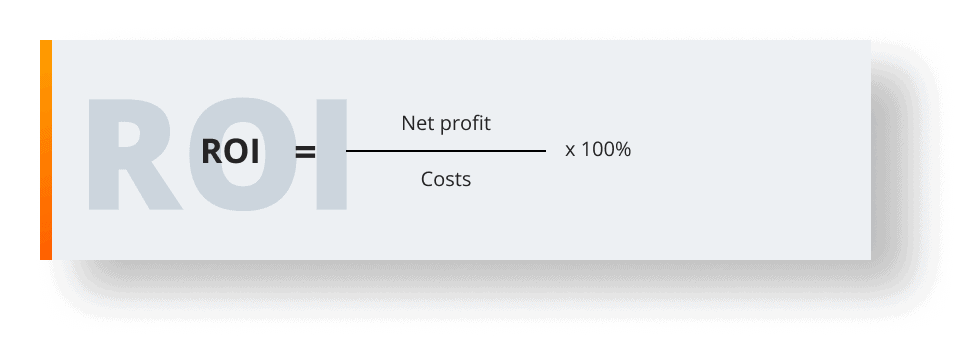
Measuring your Return on Investment – ROI
Known as ROI, return on investment is a metric that is used to help companies calculate the profitability of an investment by comparing the cost of the investment against how much income it will generate. Understanding this figure allows businesses and investors to evaluate the efficiency of the investment.
Return on Investment
ROI is used as a key aspect of analytics and is very important in shaping a company’s marketing strategies for the future. It enables them to determine which marketing tactics are working and which areas can be improved. It allows businesses to understand which areas of the business they can invest further in, with the expectation that these investments will offer the greatest returns.
Understanding ROI is very important in IT projects as it helps tech companies to allocate their time and resources into the most value areas of their operations.
We at Future Processing have used technology to solve business problems for more than 22 years and we understand the value of understanding ROI in order to make projects, and consequently businesses, successful. For this reason, we created an in-depth report of ROI in IT projects [see the link below], based on a far-reaching survey and an extensive series of interviews with industry-leading experts to understand their knowledge of ROI, how they go about it and how it affects their operations.
Who measures ROI in organisations?
In business, it is typically people in C-level roles who are responsible for measuring ROI – CIOs, CTOs, CFOs and so on. It is rare, but not unheard of, for companies to have a dedicated ‘ROI Officer’, and even rarer for businesses in the current market for companies to outsource their ROI activities to external consultants.
While the majority of companies’ ROI activities are assigned to C-level personnel (if they are assigned to anyone at all), lower-level employees in some cases do play a supporting role and can be seen as ‘co-responsible’ in managing the ROI ‘cost challenge’.
This responsibility is not necessarily limited to one area of the business either – it could also lie across departments. Typically, other staff members may have some claim to the responsibility of managing ROI in a business, such as IT managers, marketing teams and department heads.
Below are the results of our survey which details our respondents’ answers when posed the question, ‘Who is responsible for measuring ROI of IT projects in your organisation?’:
ROI is a very important metric when it comes to a business’s overall success, so the question arises, why is it often the sole responsibility of the C-Suite, Presidents and Managing Directors to manage?
One possible answer could lie in the fact that it’s virtually impossible to look at ROI from a global perspective. It’s extremely difficult (verging on impossible) to look at ROI in terms of the overall organisation because there are so many moving parts and variables in the equation that it would make it impossible to handle, and highly unreliable. In order to utilise ROI effectively, it needs to be broken down into manageable chunks according to each project or department.
Achieving optimal ROI requires each and every person involved in a project to look after their own section and take responsibility for their tasks and analysing ROI that pertains to them.
Outsourcing ROI
Given the importance of ROI metrics for a company’s success, it is surprising (to a degree) that businesses rarely (if ever) outsource their ROI activities to qualified and experienced consultants. There are several important reasons for this in the current state of the market.
Firstly, companies are reluctant to share their ROI metrics with external organisations. The world of business (particularly IT) is highly competitive, and companies are rightfully protective of their sensitive information. Not only are businesses ‘fairly reluctant’ to share this information, they tend to be in fact extremely protective of it in the majority of cases and may go to great lengths so as to not share it.
This is also the case when third party organisations work directly on a project – companies strive to only share information that is absolutely critical to their task completion and no more. This inherently means that hiring an external ROI consultant is not likely at the top of many company’s priorities.
Another reason that companies are reluctant to hire external consultants is because it’s difficult to ‘prove’ the value of their work. As an external ROI specialist, how can you accurately convey the value of your work? How can you justify a fee without having a concrete product or guarantee of a return? It is very difficult. Convincing businesses of their value is a major stumbling block for many external ROI specialists, and one that is often a deal breaker.
Lastly, when external service providers are involved in a company’s projects, it’s often on a ‘need to know’ basis. As is often the case, only information that is directly relevant to the actual tasks they perform is shared with them. This can be an issue when collecting information related to ROI, and it won’t offer the full picture.
We don’t share anything with other companies unless they are involved in it… We do not disclose all the details, only what they [external agencies] need to know regarding the project and our spending. They are given ‘enough’ information to carry our their jobs, but they aren’t let into everything – only the ‘need to know’ aspects relevant to their task.Victor Benjamin OshodiCEO, Pearly Bleuwaters
Challenges for consultants
As an external ROI consultant, putting across a good case as to how you can positively impact a company can be tricky. Often, businesses may feel that an external consultant lacks the necessary understanding of their industry to effectively help them, or they might be put off by the costs involved.
Even when companies do hire external ROI consultants, it is often the case that they do not have access to the necessary data they need to get the full picture. As well as being overly guarded about their personal information, companies themselves often lack the necessary data to share, making it very difficult to collate. Even when they do have the data, it can be of poor quality, reducing the effectiveness of analysing it.
Choosing an external ROI consultant
When choosing an external consultant, it is important to prepare beforehand in order to be in a position where you can make a well-informed decision.
Firstly, establish what your goal is in approaching an external ROI consultant and define what you’d like to get out of the arrangement. Then, just as you would do when choosing a business partner, look for a consultant who understands your goals and industry. They don’t necessarily need to share your thought processes – after all, you’re searching for a ‘fresh pair of eyes’, so it wouldn’t do much good to hire someone who thinks the same and agrees with everything you do!
Once you have found a good potential candidate, research who they are and what they’re about. Look into their work history, specialisation and any past client reviews. When you’re satisfied with a particular consultant, create an exit plan to minimise risk should the arrangement turn out not to be suitable. With the exit plan in place, you can move forward with a level of confidence and control.
Before you sign a contract, seek authenticity. This means asking the ROI provider to prove their methodology to you by potentially contracting in an ROI-based model that they will follow. Remember, ROI is not a formula, it is a responsibility.
Analytical skills are the number one asset of any ROI specialist. Consultants who are able to work objectively by looking at and analysing the facts without tainting them with their own biases or preferences is really important to the success of your business when it comes to ROI. Proper assessment and flexibility are key.
ROI consulting services
There are three main ROI consulting services that ROI consultants undertake with companies:
- An audit – This involves the evaluation of a specific area of a project.
- ROI training – The consultant offers employees training in the importance of ROI and how to manage it. This offers them the skills to continue effectively analysing and increasing ROI, even once the consultant’s job is complete.
- New ideas – A consultant is able to offer fresh ideas and information that can help drive up ROI in a business that may not have been considered previously.
Internally, organisations do not have sufficiently skilled practitioners who are able to do it [measure and manage ROI]. I don’t think they have the capability of focus, and therefore, I believe that if you scrutinise the business case for many company’s projects, they don’t pass muster.Simon ScarottConsulting Director and Business Advisor
Summary
Although not many companies currently seek external ROI consultants, there is undeniably a skills gap in the market for this service. Many companies simply don’t have the knowledge required to effectively assess their ROI and they’re missing out on a key data source for developing their businesses.
Regardless of whether ROI is handled internally or outsourced, given high priority or left to tick over in the background, its importance should never be underestimated. Every single person in an organisation should understand the value of good ROI analysis and should have a personal commitment in its development. This helps drive a company forward, reduce costs and improve their products and brand.





